In the figure (a) the light is incident at an angle θ (slightly greater than the critical angle). Now keeping the incident ray fixed a parallel slab of refractive index n3 is placed on surface AB.(fig b)
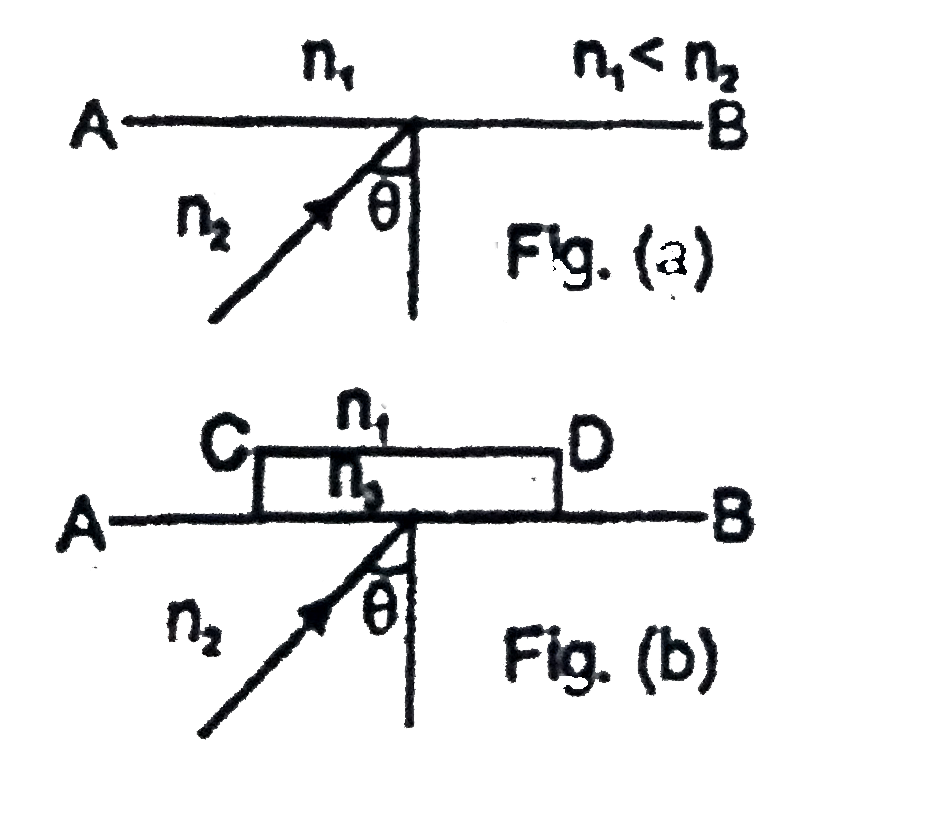
total internal reflection occurs at AB for n3<n1
total internal reflection occurs at AB for n3>n1
the ray will return back to the same medium for all values of n3
total reflection occurs at CD for n3<n1
The correct Answer is:A, C
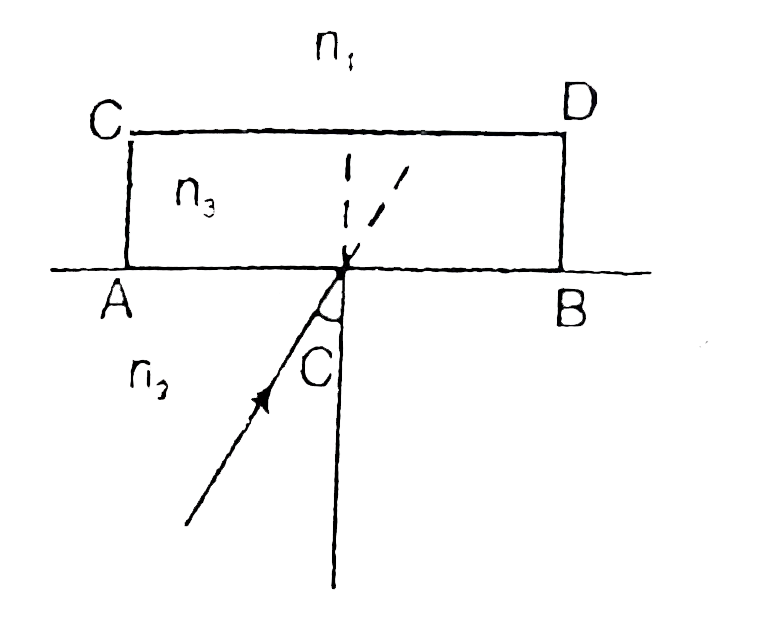
In first case
sicC=n1n2
in second case if
n3n1
(A). sinC′=n3n2<sinC
C′<C
TIR will donee at surface AB
(B). If n3>n1
sinC′>sinC
C′>C
ray will not undergo TIR at AB
(C). 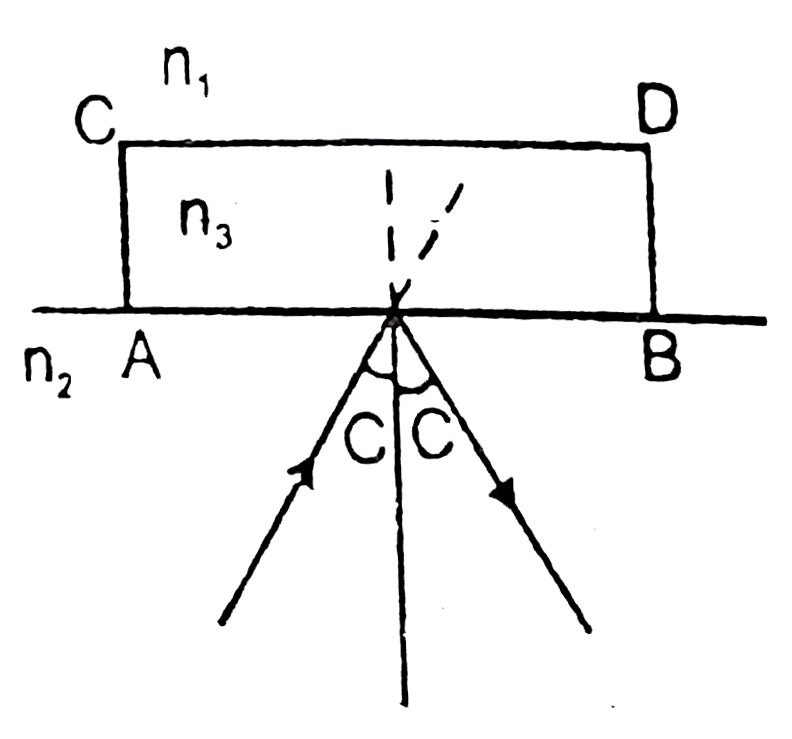
if n3>n1
n2sinC=n2sinr
sinr=n2n3sinC
=n2n3sinC
=n2n3×n1n2
sinr=n1n3=sinC''
ray will be undergo TIR at CD.
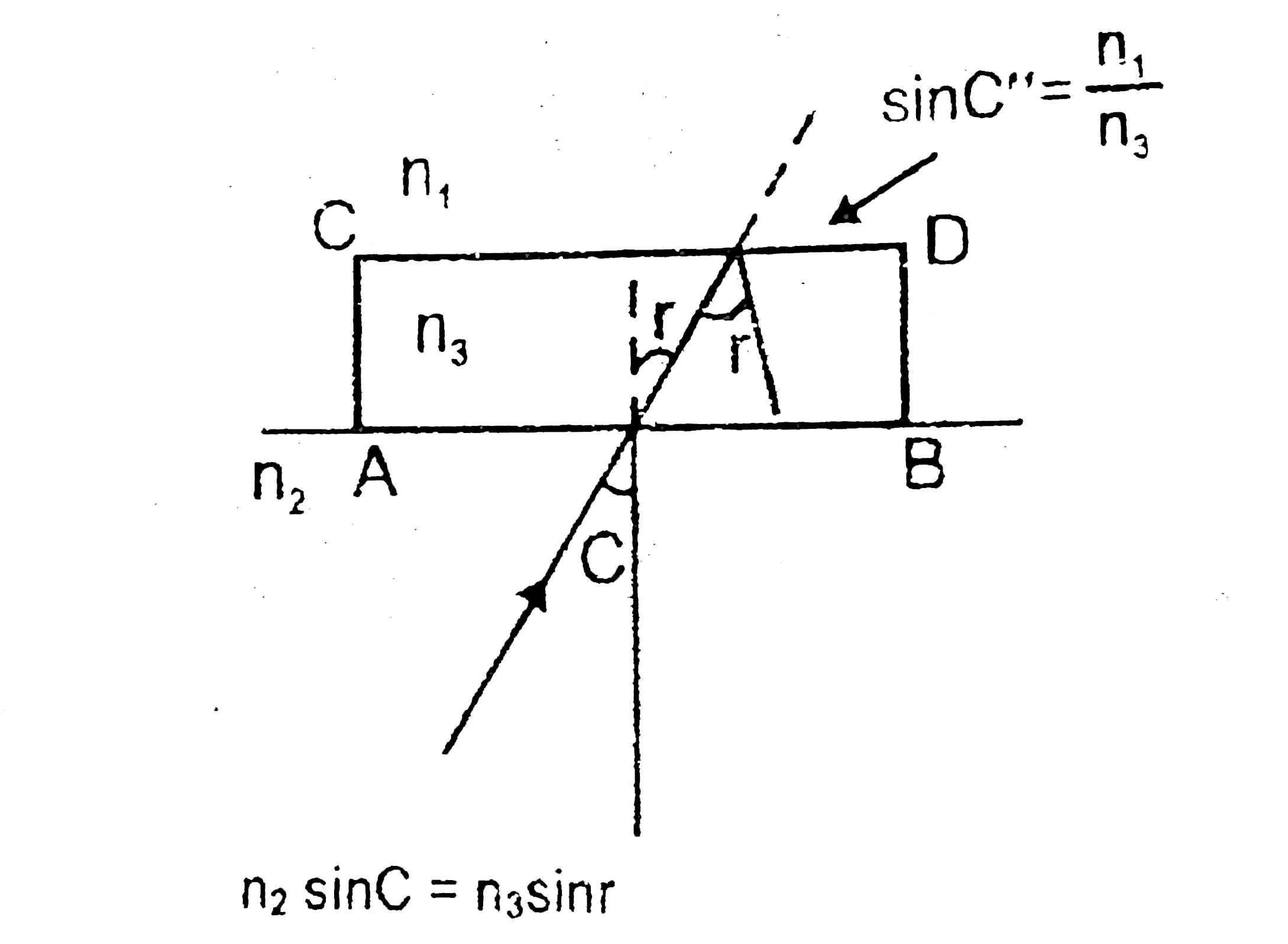
Topper's Solved these Questions
- TEST PAPERSBOOK - RESONANCECHAPTER - TEST PAPERSEXERCISE - PT-01
30 Videos
- TEST PAPERSBOOK - RESONANCECHAPTER - TEST PAPERSEXERCISE - Pt-02
30 Videos
- TEST PAPERSBOOK - RESONANCECHAPTER - TEST PAPERSEXERCISE - PART - II PHYSICS
107 Videos
- SIMPLE HARMONIC MOTION BOOK - RESONANCECHAPTER - SIMPLE HARMONIC MOTION EXERCISE - Advanced Level Problems
13 Videos
- TEST SERIESBOOK - RESONANCECHAPTER - TEST SERIESEXERCISE - PHYSICS
127 Videos
Similar Questions
The ray of light is incident at an angle of 45∘ on a glass surface. What will be the critical angle of the glass when placed in air if the light ray is deviated by 12∘ ?
View SolutionDraw ray diagrams for incident rays at angle of incidence less than critical angle and more than critical angle?
View Solution
Knowledge Check
In Figure, light is incident at an angle θ which is slightly greater than the critical angle. Now, keeping the incident angle fixed a parallel slab or refractive index n3 is placed on surface AB. Which of the following statements are correct?
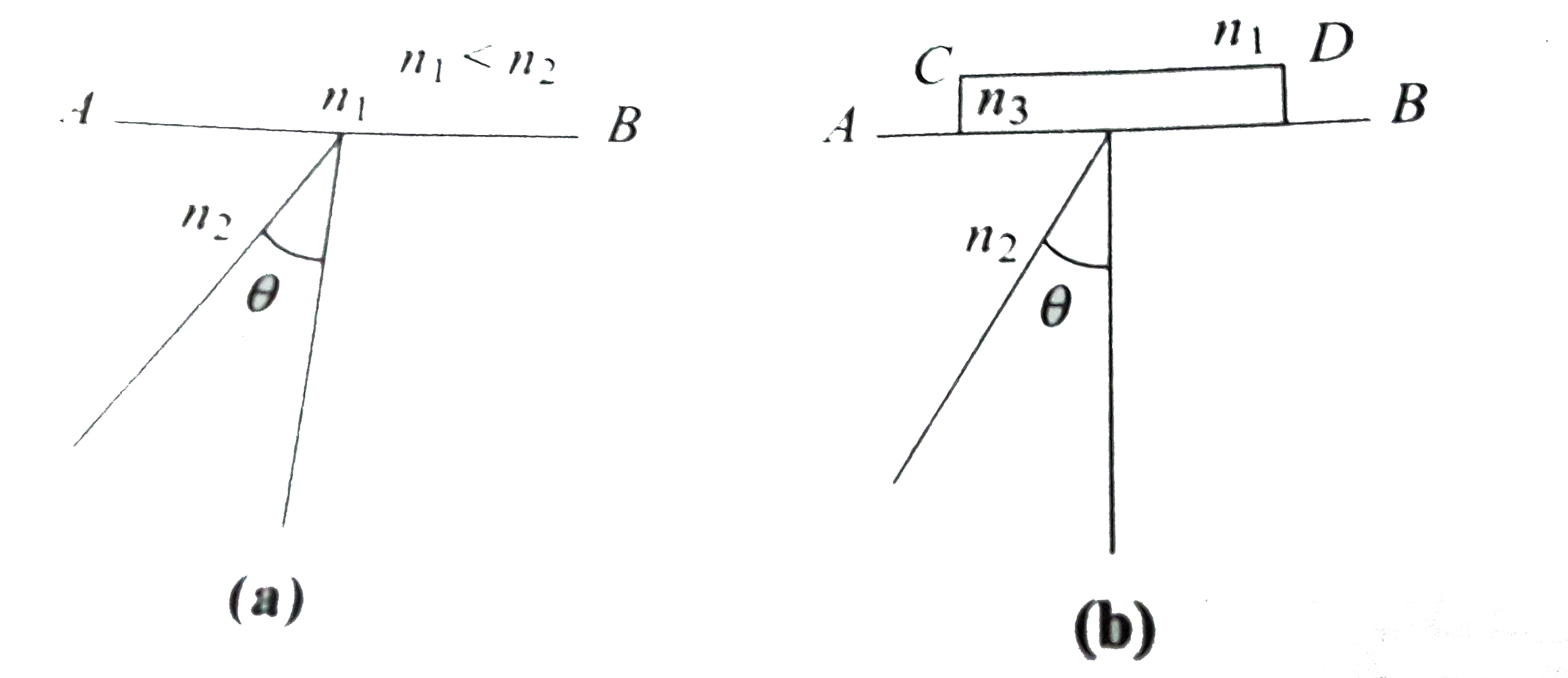 ATotal internal reflection occurs at AB for n3<n1BTotal internal reflection occurs at AB for n3>n1CThe ray will returen back to the same medium for all values of n3DTotal internal reflection occurs at CD for n3<n1
ATotal internal reflection occurs at AB for n3<n1BTotal internal reflection occurs at AB for n3>n1CThe ray will returen back to the same medium for all values of n3DTotal internal reflection occurs at CD for n3<n1Light is incident on a glass surface at polarising angle of 57.5∘ Then the angle between the incident ray and the refracted ray is
A57.5∘B115∘C65∘D205∘A ray of light travelling in water is incident on its surface open to air. The angle of incidence is θ, which is less than the critical angle. Then there will be
AOnly a reflected ray and no refrcted rayBOnly a refracted ray and no reflectedCA reflected raya and a refractedray and the angle between them would be less than180∘−2θDA reflected ray and refracted ray and the angle between them would be greater than 180∘−2θ
A ray of light is incident on a transparent plate of a material of refractive index √3 at the polarising angle. Find the angle of refraction.
View SolutionA monochromatic light is incident on the plane interface AB between two media of refractive indices μ1 and (μ2>μ1) at an angle of incidence θ as shown in Fig.
The angle θ is infinitesimally greater than the critical angle for the two media so that total internal reflection takes place. Now, if a transparent slab DEFG of uniform thickness and of refractive index μ3 is introduced on the interface (as shown in the figure), show that for any value of μ3 all light will ultimately be reflected back into medium II.
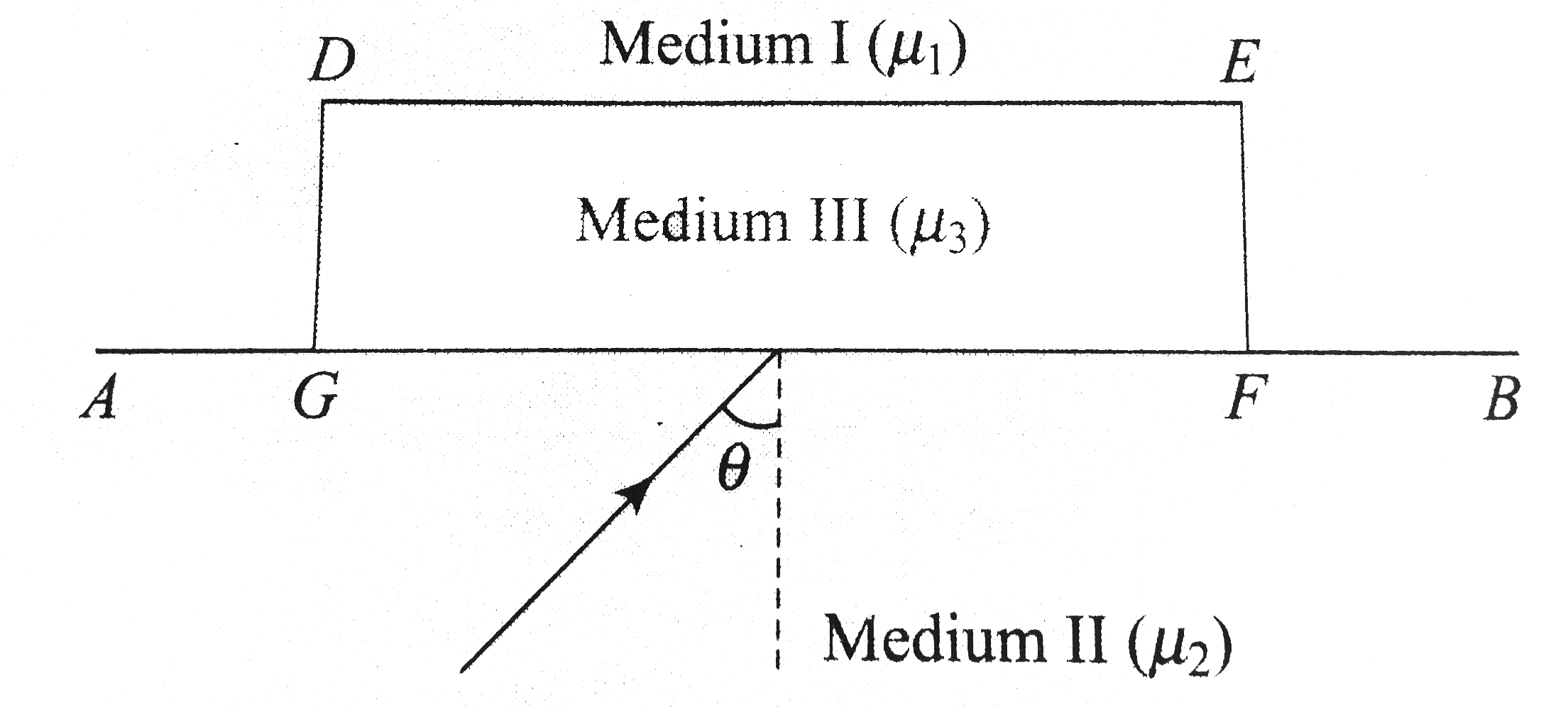
View SolutionThe critical angle of incidence in a glass slab placed in air is 45∘. What will be be the critical angle when the glass slab is immersed in water of refractive index 1.33 ?
View SolutionA ray of light is incident on ice slab making an angle of 50∘ with the normal. The angle of refraction and velocity of light in ice of the refractive index 1.3 are
View SolutionA light ray is incident at an angle 45∘ on parallel sided glass slab and emerges out grazing the vertical surface. The refractive index of the slab is
View Solution
